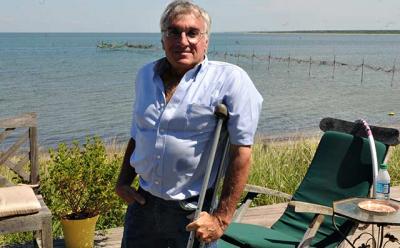Victories Aplenty, but Challenges Remain

When the East End Disabilities Group was formed in 1994, the Americans with Disabilities Act was just four years old and many public spaces and businesses on the East End and across the country were not accessible to those with mobility challenges. There were no assistive listening devices in movie theaters, many restaurant bathrooms did not accommodate a wheelchair, and, perhaps most surprising, children in wheelchairs could not get to second-story classrooms in some local schools.
If the South Fork has come a long way in the 21 years since then, it is largely due to the dogged persistence of the East End Disabilities Group, whose volunteers have served as a voice and resource for a community whose needs are all too often overlooked.
“You can go everywhere in East Hampton and see examples of what we’ve been involved in,” said Glenn Hall, the group’s chairman and a member from the beginning.
In preparing to launch its new website this summer, Mr. Hall had the chance to take stock of the group’s considerable accomplishments and also to reflect on how much remains to be done.
The website, eedginc.org, recounts the history of the organization, shares some of its victories, and points to long-term projects and ongoing challenges. It also offers a sizable list of resources for people dealing with physical disabilities and mental health issues and for businesses and institutions that need guidance on complying with the law, all gleaned from the group’s two-plus decades of advocacy. It is a list that Mr. Hall expects will grow.
“Almost everything we’ve done has been need-driven, complaint-driven,” Mr. Hall said Monday. The group’s first action was securing A.D.A. compliance at the United Artists Theater in East Hampton, whose corporate management had resisted the necessary changes. The weekend before Memorial Day in 1994, supporters picketed the movie theater, calling for a boycott. The changes were made within days, and the corporation followed suit at its theater in Southampton.
______________________
‘In a moment anybody can become disabled — it’s about civil rights.’
— Glen Hall
______________________
A few years later, the organization successfully petitioned the Bridgehampton School to add an elevator so second-floor classrooms, including the library and science room, could be accessible to students, teachers, staff, and visitors with disabilities. It pushed for the removal of similar barriers at other local schools and public institutions like Guild Hall, where members picketed during the 1997 Hamptons International Film Festival, and made very public calls for accessibility at local restaurants and other businesses. The group’s position, Mr. Hall said in a 1996 article in The East Hampton Star, “is not us against them — in a moment anybody can become disabled — it’s about civil rights.”
Mr. Hall often has to explain that while it is great that A.D.A. is the law of the land, “having a law doesn’t fix anything, it just gives you the tools to fix things.” Effecting change and ensuring adherence to the law often requires activist organizations like the East End Disabilities Group, he said. “It is through vigilance and awareness and education that it happens.”
Mr Hall is not the only founding member of the group who has remained active over the years. Gerry Mooney, who manages affordable housing projects in East Hampton, and his wife, Deborah Hoey, are still with the organization. But other longtime members have less energy to give as they age. “So many of the core group from the ’90s are gone and finding replacements is not easy,” Mr. Hall said. Still, he said, the work remains as important as ever. “Everybody knows somebody who is disabled, but you can’t get into stores all over this town and village.”
The Disabilities Group’s big push over the past year has been for improved mental health services on the East End. In working to correct earlier fiscal troubles, East Hampton Town several years ago “took over $200,000 worth of mental health services from the Human Services Department,” Mr. Hall said. “We were the ones saying you can’t do this. . . . The mental health services offered by the town had slowly built up over a 20, 30-year period.”
His group has been working to identify unmet mental health needs in the town and to push, along with others, for ways to meet them.
The launching of the website marks a turning point for the organization, which Mr. Hall hopes can transition to having a part-time paid director and a secretarial staff. “We really can’t do this without funding.”
